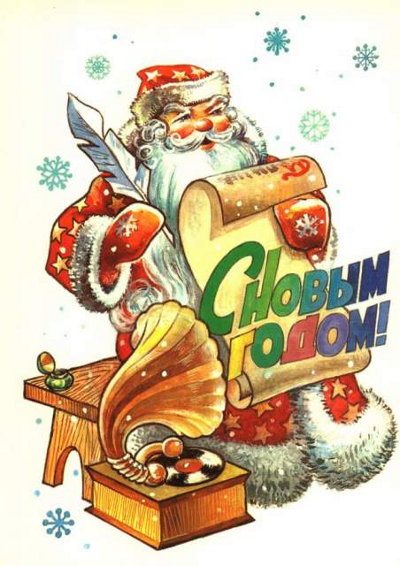Categories: "Holidays"
Новый год — 2010
To wish someone well on December 31st, in English we say “Happy New Year.” If we are having an anal retentive moment and wish to use a complete sentence, we say “We wish you a Happy New Year.” (Nota bene: we usually capitalize all three words.) The Russian equivalents are «С Новым годом» and «Поздравляем вас с Новым годом». The latter literally means “We congratulate you upon the occasion of the New Year.” (Nota bene: the single Russian sound «с» is equivalent to the English phrase “upon the occasion of”. See how superior Russian is to the decaying languages of the West? Begin learning Russian immediately, if not sooner.)
The person you congratulate appears in accusative case, so if you want to add a laconic “you, too”, then the you must again use the accusative case:
| — С Новым годом! — И вас, тоже. |
“Happy New Year!” “You, too.” |
At Christmastide we often supplement “Merry Christmas” with “and many happy returns!” The Russians often supplement «с Новым годом» with «с новым счастьем» “and new happiness/fortune”, which, come to think of it, is pretty similar in spirit to the English phrase, though obviously not a word-for-word translation. It is not traditional in English to add “many happy returns” to a New Year's wish, but on this occasion we’ll let that slide:
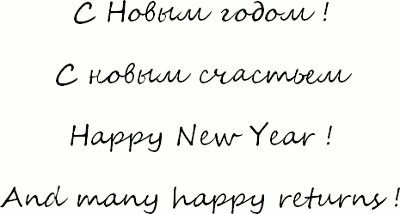
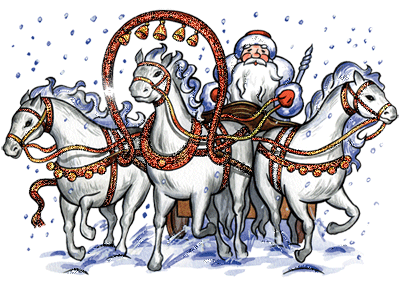
Рождество — 2010
The Russian word for Christmas is Рождество, which comes from the verb родить “to give birth.” Here we have the text in which the Wise Men seek out Jesus (Matt 2:9-11). The text on the left is from the Russian Synodal Bible, which uses pre-revolutionary spelling. The text on the right is from the King James Bible.
| Они, выслушавши царя, пошли. И — се, звѣзда, которую видѣли они на востокѣ, шла передъ ними, какъ наконецъ пришла, и остановилась надъ мѣстомъ, гдѣ былъ Младенецъ. Увидѣвши же звѣзду, они возрадовались радостью весьма великою, и вошедши въ домъ, увидѣли Младенца съ Маріею, Матерью Его и падши поклонились Ему; и открывши сокровища свои, принесли ему дары: золото, ладанъ и смирну. | When they had heard the king, they departed; and, lo, the star, which they saw in the east, went before them, till it came and stood over where the young child was. When they saw the star, they rejoiced with exceeding great joy. And when they were come into the house, they saw the young child with Mary his mother, and fell down, and worshipped him: and when they had opened their treasures, they presented unto him gifts; gold, and frankincense, and myrrh. |
С Рождеством Христовым! | |
| Merry Christmas! | |
Ёлочная игрушка
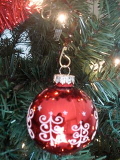 In the light of recent holidays I've decided to talk about something that gives our ёлка (New Year's tree) its holiday beauty. Ёлочные игрушки (ornaments) come in different shapes, forms, and colors to satisfy any picky decorator.
In the light of recent holidays I've decided to talk about something that gives our ёлка (New Year's tree) its holiday beauty. Ёлочные игрушки (ornaments) come in different shapes, forms, and colors to satisfy any picky decorator.
In Russian an ornament is more often called игрушка ‘toy’ rather than украшение ‘decoration.’ It turns out that the name came about historically. First игрушки were made out of metal, wood or fabrics, and kids could play with them without breaking them and worrying their parents. Later people started making very thin glass ornaments that could only serve for decorative purposes. (source)
For most Russians New Year's is the most important holiday of the year. We even have a saying «Как встретишь Новый год, так его и проведёшь». It means “The way you celebrate the New Year is the way you will spend the rest of it.” That is why we try to make the best of this holiday to ensure our success in the year to come.
I remember being a little girl and waiting for the New Year. It seemed that even the air outside smelled different, especially festive and solemn. I would help prepare a delicious dinner, decorate «нашу ёлку ёлочными игрушками» “our fir tree with ornaments” and wait for Дед Мороз “Santa Claus” to bring me my presents. What a magical time that was!
Поздравлять/поздравить
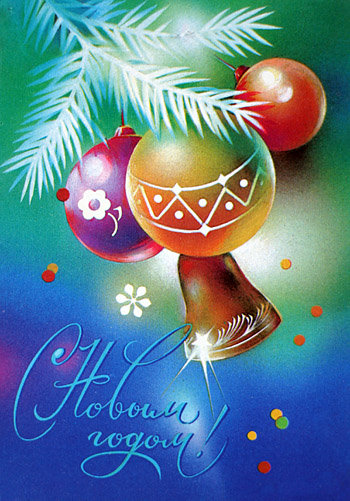
Ah, pity the poor foreigner who has to come to the US and offer his congratulations to someone. If it's December 25th, he must say “Merry Christmas,” whereas “Happy Christmas” just sounds weird. If it's January first, he must say “Happy New Year,” whereas “Merry New Year” sounds freakish. If it's a wedding or birth or a graduation, then he must say “congratulations.” It's enough to drive a foreigner back home.
The Russians, on the other hand, have a verb that works for absolutely every holiday and well-wishing event, and that is the verb поздравлять/поздравить “to congratulate.” It is conjugated like this:
| to congratulate | ||
| Imperfective | Perfective | |
| Infinitive | поздравлять | поздравить |
| Past | поздравлял поздравляла поздравляло поздравляли |
поздравил поздравила поздравило поздравили |
| Present | поздравляю поздравляешь поздравляет поздравляем поздравляете поздравляют |
No such thing as perfective present in Russian. |
| Future |
буду поздравлять будешь поздравлять будет поздравлять будем поздравлять будете поздравлять будут поздравлять |
поздравлю поздравишь поздравит поздравим поздравите поздравят |
| Imperative | поздравляй(те) | поздравь(те) |
The person you congratulate goes in the accusative case:
| Поздравляю тебя! | Congratulations! |
| Поздравляю вас! | Congratulations! |
| Она поздравила меня. | She congratulated me. |
| Виктор поздравил её | Victor congratulated her. |
If you mention the event triggering the congratulations, it goes in the instrumental case after the preposition с:
| Поздравляю тебя с Новым годом! | Happy New Year! |
| Поздравляю вас с Рождеством Христовым! | Merry Christmas! |
The Russians also sometimes simply skip the person and the verb, leaving only the prepositonal phrase:
| С Новым годом! | Happy New Year! |
| С Рождеством Христовым! | Merry Christmas! |
Although the event may be the name of a holiday, it could also be a good grade, or a new car, or pretty well anything else:
| Миша поздравил Таню с пятёркой. | Misha congratulated Tanya for getting an A. |
| Поздравляю с новой машиной! | Congatulations on the new car! |
| — Здравствуйте, Иван Андреевич! Я слышал, что в прошлом месяце Ваш развод наконец-то был окончательно оформлен. Поздравляю Вас! — Благодарю Вас. Вас благодарит и моя новая жена. — Что-что? Вы ещё раз женились? Ну… значит… ы-ы-ы… поздравляю Вас и со свадьбой. — От всей души благодарю. |
“Hello, Ivan Andreevich, I heard that last month your divorce was finalized. Congratulations!” “I thank you very much. My new wife also thanks you.” “What's that? You've already remarried? Well… so… ummm… congratulations upon your marriage.” “I thank you from the bottom of my heart.” |
Ноль, нуль (часть первая)
Russian has two words for zero, and they are ноль and нуль. For most purposes they are completely interchangeable and decline like this:
| Sg | Pl | |
| Nom | ноль | ноли |
| Acc | ноль | ноли |
| Gen | ноля | нолей |
| Pre | ноле | нолях |
| Dat | нолю | нолям |
| Ins | нолём | нолями |
You will most encounter these words is when reading phone numbers out loud. In the US one usually reads phone numbers out loud digit by digit:
| The number | is pronounced |
| 792-0390 | seven nine two oh three nine oh |
In Russia they usually break up a seven-digit number into groups of 3-2-2, and you say ноль only when the zero is the first unit in a group of two or three digits, thus:
| The number | is pronounced |
| 792-03-90 | семьсот девяносто два, ноль три, девяносто |
(The first zero is pronounced as ноль, and the second zero is understood as part of девяносто.)
In the US most people do not refer to the time of day using the twenty-four hour clock (“military time”) unless they have served in the military or are engaged in precise time-keeping functions, but in Russia all official schedules are posted in twenty-four time, so the phrase «ноль часов ноль минут», which means literally “zero hours zero minutes” and can be translated “oh zero hundred” in military parlance, sounds perfectly normal to an average Russian. You can even hear the phrase in the song «В ноль часов и ноль минут» “At midnight,” which is a cute little tune about how hard it is as a child to stay awake all the way till midnight on New Year's Eve. Click the title of the song just above to hear it. Do listen to it. It's charming.
